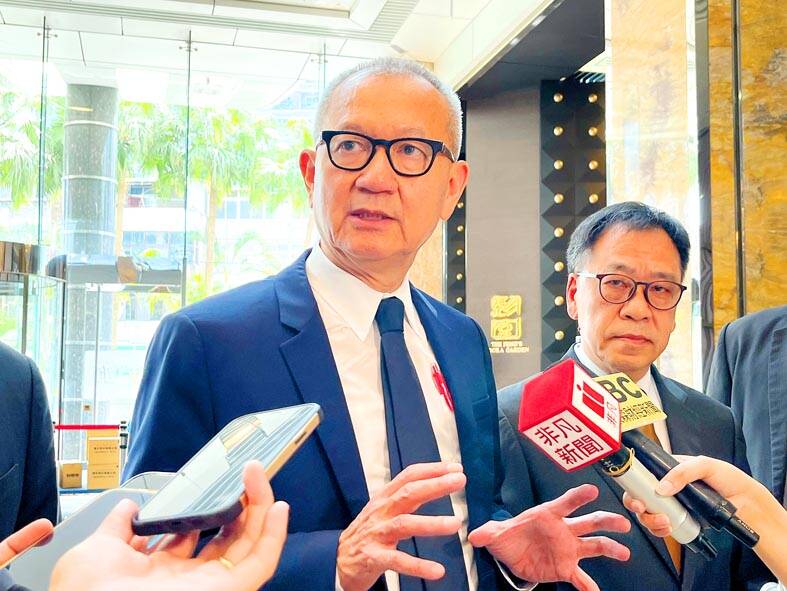Yageo Corp (國巨), the world’s third-largest multilayer ceramic capacitors supplier, saw its stock price spike 1.35 percent in the morning session after it reported a yearly growth of 11 percent in net profits and gave an upbeat outlook for the current quarter.
Shares retreated in the later trading session and closed 0.84 percent lower at NT$588 yesterday. The stock outperformed the broader TAIEX, which tumbled 3.81 percent.
Net profits expanded to NT$4.61 billion (US$141.79 million) last quarter, from NT$4.13 billion in the first quarter last year, representing a quarterly decline of 2.9 percent. Earnings per share rose to NT$11.02 last quarter from NT$9.9 a year earlier, but lower than NT$11.35 a quarter earlier.

Photo: CNA
Yageo is optimistic about this quarter’s business outlook, although full-blown recovery in demand is not happening yet, it said.
One more encouraging sign is that channel inventory correction, which has been closely monitored by investors, is coming to an end this quarter, the company said during an online investors’ conference on Thursday, adding that it already saw “some restocking activities” this quarter.
“From the market side, we see a couple of positive signs. Segments like computing and telecom and mobile are picking up slightly and gradually picking up,” Yageo CEO David Wang (王淡如) said. “We see artificial intelligence [AI] indeed is a very positive trend. We believe that with comprehensive product offerings and strong design capabilities, we are prepared to grow with this trend.”
Yageo has witnessed a significant annual growth in components used in AI applications, such as servers and data centers, in the first quarter of this year, Yageo executive vice president of global sales and marketing Claudio Lollini said on Thursday.
Those components deliver better margins than the corporate average level, given the higher degrees of design involved, Lollini said.
New projects are also kicking in, Lollini added.
For the current quarter, the company saw its book-to-bill ratio stand at 1, Wang said, an indication that the company’s business is in a good shape.
Revenue this quarter is to grow sequentially at a low-single-digit percentage from the NT$28.51 billion generated in the first quarter, Wang said, adding that gross margin would also improve by low-single-digit percentage points from 33.8 percent last quarter.
Yageo also guided for a mild improvement in factory utilization this quarter, likely the first advancement since the fourth quarter of 2022.
The utilization of manufacturing equipment for premier passive components would rise slightly this quarter, compared with 70 percent registered last quarter, Yageo said, adding that the usage of manufacturing equipment for commodity-type products would also go up slightly from 50 percent last quarter.
Premium components accounted for about 75 percent of the company’s revenue, Yageo said.
Its sensor business accounted for 12 percent of the company’s revenue last quarter, which was singled out for the first time since its acquisition of Telemecanique Sensors last year. Magnetic components were the biggest revenue contributor last quarter, accounting for 30 percent. That was followed by multilayer ceramic capacitors’ 20 percent.
The industrial segment made up 36 percent of last quarter’s revenue while the computing, enterprise systems segment, which includes components used in servers, was the second-largest, accounting for 21 percent.

Taiwan will prioritize the development of silicon photonics by taking advantage of its strength in the semiconductor industry to build another shield to protect the local economy, National Development Council (NDC) Minister Paul Liu (劉鏡清) said yesterday. Speaking at a meeting of the legislature’s Economics Committee, Liu said Taiwan already has the artificial intelligence (AI) industry as a shield, after the semiconductor industry, to safeguard the country, and is looking at new unique fields to build more economic shields. While Taiwan will further strengthen its existing shields, over the longer term, the country is determined to focus on such potential segments as

UNCERTAINTY: Innolux activated a stringent supply chain management mechanism, as it did during the COVID-19 pandemic, to ensure optimal inventory levels for customers Flat-panel display makers AUO Corp (友達) and Innolux Corp (群創) yesterday said that about 12 to 20 percent of their display business is at risk of potential US tariffs and that they would relocate production or shipment destinations to mitigate the levies’ effects. US tariffs would have a direct impact of US$200 million on AUO’s revenue, company chairman Paul Peng (彭雙浪) told reporters on the sidelines of the Touch Taiwan trade show in Taipei yesterday. That would make up about 12 percent of the company’s overall revenue. To cope with the tariff uncertainty, AUO plans to allocate its production to manufacturing facilities in

COLLABORATION: Given Taiwan’s key position in global supply chains, the US firm is discussing strategies with local partners and clients to deal with global uncertainties Advanced Micro Devices Inc (AMD) yesterday said it is meeting with local ecosystem partners, including Taiwan Semiconductor Manufacturing Co (TSMC, 台積電), to discuss strategies, including long-term manufacturing, to navigate uncertainties such as US tariffs, as Taiwan occupies an important position in global supply chains. AMD chief executive officer Lisa Su (蘇姿丰) told reporters that Taiwan is an important part of the chip designer’s ecosystem and she is discussing with partners and customers in Taiwan to forge strong collaborations on different areas during this critical period. AMD has just become the first artificial-intelligence (AI) server chip customer of TSMC to utilize its advanced

Chizuko Kimura has become the first female sushi chef in the world to win a Michelin star, fulfilling a promise she made to her dying husband to continue his legacy. The 54-year-old Japanese chef regained the Michelin star her late husband, Shunei Kimura, won three years ago for their Sushi Shunei restaurant in Paris. For Shunei Kimura, the star was a dream come true. However, the joy was short-lived. He died from cancer just three months later in June 2022. He was 65. The following year, the restaurant in the heart of Montmartre lost its star rating. Chizuko Kimura insisted that the new star is still down